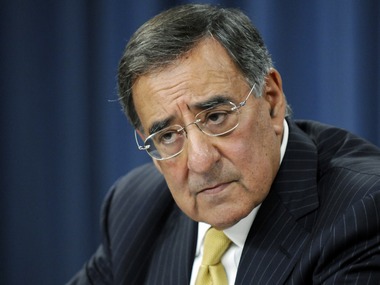New York: US Defence Secretary Leon Panetta has begun a nine-day trip to Asia that includes India to brief allies on America’s new Asia-Pacific defence strategy. The Panetta tour is expected to deliver concrete details and explanations of future US defence plans to regional partners, as a follow-up to a major Pentagon strategy review released in January this year which created a buzz. Panetta, the former CIA chief, will visit New Delhi on the last leg of his swing through Asia which will include stops in Japan, Vietnam and Singapore for the annual Shangri-La Dialogue. Although no trade delegation will be joining Panetta on this trip, sales of big-ticket weaponry will be part of the agenda. Defence cooperation across the board, including potential sales of US weaponry, will be talked about during Panetta’s two-day stop in Delhi next week, where he will meet with Defence Minister AK Antony. [caption id=“attachment_318531” align=“alignright” width=“380” caption=“Leon Panetta will discuss defence cooperation during his upcoming visit to India. Reuters”]  [/caption] America’s Asia pivot comes as China has unsettled its neighbours by renewed tensions over competing sovereignty claims in the South China Sea and with the expansion of its navy and improvements in missile capabilities. The Pentagon is worried about China’s strategic goals as it begins to field a new generation of weapons. Panetta’s Asia tour will be watched closely by China. The Pentagon’s eight-page strategic review document unveiled by President Obama in January called for a US strategic shift toward Asia while remaining vague as to how the “pivot”, as it is called by analysts, would be practically carried out. “What we’re trying to do with the swing through Asia is to give a comprehensive account to partners and everyone in the region about what the rebalance to the Asia-Pacific will mean in practice,” a senior defence official said while briefing reporters about the trip. The strategic review released in January practically came out and said outright that it views India as a counterbalance to China. It said the US is “investing in a long-term strategic partnership with India to support its ability to serve as a regional economic anchor and provider of security in the broader Indian Ocean region.” The senior defence official briefing reporters on Wednesday about Panetta’s current tour pointed out: “India is the only country we mention in the defence strategic guidance as a partner. And we are really shifting to a point at which our defence interactions with India is just going to be on a steady roll.” America’s projection of power into Asia has always been borne on the decks of warships, which carried US interests across the Pacific Ocean. The Obama administration also sees a big role for India in bridging the Indian and Pacific Oceans. “The US has always been a Pacific power because of our very great blessing of geography. And India straddling the waters from the Indian to the Pacific Ocean is, with us, a steward of these waterways. We are both deeply invested in shaping the future of the region that they connect,” America’s top diplomat Hillary Clinton had earlier told her audience in Chennai. While the US was bogged down in Iraq and Afghanistan, China had the headroom to expand its influence in the region with allies like North Korea, Pakistan, Myanmar and Sri Lanka. It has established itself as a growing, and sometimes bullying, power in the Pacific, particularly in East Asia. Most of the countries in the Association of Southeast Asian Nations (ASEAN) have festering territorial disputes with China. Analysts say a rising China has spurred America to consolidate ties with regional powers like Japan, India, Australia, Indonesia and the Philippines in a policy “pivot” towards Asia. “India got a shout out in the new strategic guidance that other countries did not,” Karl Inderfurth, a South Asia analyst at the Center for Strategic and International Studies, told Reuters. “The United States is looking to India for more than defence trade…It is looking to India to contribute as a provider of security in the broader Indian Ocean region,” added the former assistant secretary of state for South Asia affairs. Inderfurth said Indian officials will have probing questions for the Pentagon chief about Afghanistan. India is concerned that a premature US pullout before Afghan forces are ready to take over security could destabilise Afghanistan, making it another Pakistan-like haven for Islamic extremists bent on spreading jihad in Kashmir. Without citing any specific weapon systems that Panetta might mention during exchanges with Indian officials, observers are speculating that the F-35 Joint Strike Fighter could be among the topics of conversation.
Indo-US defence cooperation and a dialogue on US plans for a pullout from Afghanistan are top of the agenda.
Advertisement
End of Article


)

)
)
)
)
)
)
)
)



